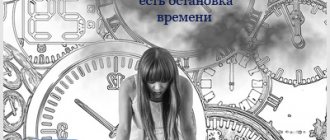When a close or not so close friend once again tells you, full of inspiration, how pleased she is to finally do something that she has long wanted to try, but never got around to, you probably have thoughts like: “I would I could do it too,” “Pfft, great science,” and the like. But let's face the truth: partly it is envy that dictates the appearance of such thoughts.
Try to answer the question for yourself: why didn’t you do and are still not doing what you wanted for a long time? If you have difficulty finding answers, you will find them in this article.
In this article:
How to be more productiveSpecificity is keyThe skills of productive people
What does the word "productivity" mean?
And is there really unproductive work? Happens. Because working productively means fruitfully, with high productivity and good results. Only productive work allows a person to realize his ideas and achieve success.
The word “productive” itself comes from the English “productivity”. Initially, it was used in animal husbandry and agriculture to designate the best specimens of animals - fertile and giving good offspring. Over time, when industry began to develop, it began to be used to characterize production.
In Russian, the word “productivity” has a synonym – productivity. We are all familiar with the phrase “labor productivity”. Not so long ago they began to use it to characterize the activities of creative people, as if emphasizing their “fertility” and high results. Thus, we can say that productivity is the ability to create something or perform a certain number of actions in a certain time.
When talking about someone's productivity, you can measure it not only in quantity, but also give it an emotional assessment. For example, low productivity or high productivity. Productivity cannot be said to be an innate human property. Most likely, this is a skill that, if desired, can be acquired, developed and improved.
Bonus: if emotions get in the way
It happens that we cannot set priorities, make plans and even rest, because we are in a state of apathy and constantly experience negative emotions. This condition is usually associated with the presence of stress factors in our lives. And, of course, you won’t be able to introduce new rules into your life if your body is exhausted. First you need to regain your strength and come to your senses. To do this, you can drink it, which will allow you to improve your mood, gain clarity of thoughts, and also restore your ability to concentrate.
Modern drugs do not cause addiction and are completely safe. Just a few weeks of use and you will regain your peace of mind and desire for action. In case of a life crisis, you should seek help from a professional who will help you get out of it and start moving in a new direction.
What kind of work can be called productive?
Knowing your personal productivity and being able to manage it is important to achieve success. In business, productivity can be measured by profit growth. What criteria should we use to determine whether our work is productive? German sociologist Erich Fromm believed that personal productivity depends on the ability to use one’s strengths and realize the abilities inherent in nature.
Whatever a person does, his work can be called productive if he:
- gets satisfaction from work (it is impossible to work productively if the work is boring and uninteresting);
- does it efficiently;
- takes initiative;
- does not look at the time and does not count the hours he spends on it - as they say, he is “burning with work.”
Based on this, we can conclude that work productivity does not depend on the amount of time spent on it. And those employers who are trying to increase employee productivity and, accordingly, profits, by increasing the working hours are wrong.
Rule #3: Rest
We have already talked above about the fact that there should be time for procrastination, but also for proper rest. Let it be one day a week that you spend in nature, reading fiction, walking with your family or visiting friends. This will be your day of recuperation, because they are not limitless. Only those who fully rest and do not force their body to be under stress can work well and productively. And don’t forget to sleep at least 7-8 hours, this is also a sacred time to replenish your strength so that you are full of energy the next day.
What prevents you from being productive?
Before we get ready to work productively, we need to understand what is stopping us from doing so. After all, we often spend a lot of time on work, waste strength and energy, and the results leave much to be desired.
One of the reasons that prevents us from being productive is persistence . Perhaps sometimes this quality needs to be demonstrated. At the same time, some people often continue to move towards their goal even when it has already lost its meaning. Most likely, they do this out of inertia or without noticing the changes that have occurred. Therefore, to avoid heading down a hopeless course, it is important to reconsider your goals from time to time and ask yourself whether they are still relevant.
Another trap that reduces productivity is called amplification . It is known that every job requires a certain amount of effort, but often people spend more time and effort to achieve a goal than necessary - they waste it. Amplification is characterized by repeating the same steps to ensure that everything is done correctly over and over again.
fixation , when progress towards a goal is blocked, also prevents you from doing your work productively Instead of acting, a person plunges into a state of anticipation - inspiration, a phone call, permission, next month, vacation, etc. Fixation is a pure waste of time, in other words, killing it.
Reversion also has a negative impact on work productivity - a mental return to the past, replaying a life scenario, regret about unrealized opportunities, endless thoughts about what should have been done so that what has already happened would not happen.
Getting ahead of the curve is also a trap that reduces productivity. First, when planning for the future, we often waste time because we cannot foresee all the details in advance and rely on opportunities that may disappear in the future. Secondly, when we focus on future tasks, we forget about current ones.
Tightening . Probably everyone had to promise themselves: I will do this on Monday (after the New Year, etc.). By this we deceive ourselves, and in our hearts we understand this very well. Such constant postponement of the deadline will never allow our work to become productive.
Rule #2: Plan
The basis of all time management techniques is planning. It is known that our brain, of two paths, will always choose the one with the least resistance. That is, its task is to ensure that we spend a minimum of effort and conserve energy for the normal functioning of all life systems. And if we spend less effort watching a series than studying a new discipline, then the brain will hold the series in high esteem. He will also always give preference to immediate pleasure. Should I eat a pie now or go to the gym to lose 5 kg in a month? Of course, eat the pie. It will definitely make you feel good right now. And a month is too long.
For the brain, we are present and we are future - always two different people. And he only needs to care about the one that is here and now. And to force ourselves to be more productive and avoid brain tricks, we need strict control, which is achieved by total planning. This means that we must plan not only our working time, but also our free time. Otherwise, all the hours without work may suddenly be spent watching the same TV series. This does not mean that there will be no rest. Procrastination time is also worth planning.
Set aside an hour or two a day for freedom of action. During this time, you can do all the unproductive things, for example, sit on social networks or watch jokes on the Internet. This way, your procrastination will not take up all your free hours, and the rest of the time you can be productive, as you will be doing useful things.
How to increase your productivity at work
It would seem that it could be simpler: they come to work to work. But everyone understands that few people work productively for all 8 hours. In addition to the time allotted for lunch, breaks are taken for tea, conversations, “walks” on the Internet, etc.
In order for your working day to be productive, you need to:
Make a work plan for the whole day
If this is not done immediately after arriving at work, then there is a high chance that we will be involved in fruitless conversations or read personal email, putting things off for at least an hour.
Don't spread yourself thin
To get real results, you should not plan to complete more than three tasks per working day. But all your efforts can be directed to solving them, not forgetting to take short breaks after each of them.
Complex problems need to be solved first
Otherwise, the problem will hang like a sword of Damocles, distracting you from other tasks.
Come up with a competitor
Many people are no strangers to the desire to be the best in their profession. By choosing a person among our employees with whom we can mentally compete, we will receive an additional incentive to work more productively.
Don't go online unnecessarily
If it’s hard to resist the temptation, it’s a good idea to install an application that “throws” us out of the network.
Solve similar problems together
For example, checking email or making phone calls will take less time if you do them all at once rather than doing them periodically throughout the day.
Be punctual
To ensure that the solution to one problem does not stretch out over the whole day, it is necessary to control the time spent on solving it and adhere to the time frame.
Be able to say “no”
Without mastering this skill, we will spend our valuable time on doing other people’s business and tasks, on useless conversations. Someone said: “Our time is the most valuable gift we can give to other people.” Therefore, you shouldn’t waste them.
Don't put off the most difficult task until the last hour of work
At this time, it is better to relax and take stock. Although many, on the contrary, come to their senses and begin to work only when the working day is nearing its end.
Don't set your internal clock to winter time
Often the most productive hour is this morning, when everyone at home is still asleep.
TOP 6 books to increase productivity
There are many books that describe ways to increase productivity. Many of them are bestsellers and are actively advertised both online and in bookstores. Some of them can really help a person radically change his life, but not all of them. People who want to increase their productivity and get actionable advice on this issue should pay attention to six popular publications:
- Extreme time management. Nikolay Mrochkovsky and Alexey Tolkachev. This book teaches you to think critically about yourself. It completely rejects laziness and helps you plan your work and rest time as efficiently as possible.
- Productive morning. Michael Nixon. Helps you learn to plan and systematize your affairs, divide them into categories, and thereby solve them effectively. Laconic and concise style of presentation.
- Productivity formula. Orestes Zub. This book is ideal for those who are starting to work on developing their productivity. She describes the basic rules of time management, personal motivation and career growth in accessible language.
- Do the job. Steven Pressfield. A book that will be especially interesting to creative people. The author shows what you need to go through in order to realize yourself and teaches you how to deal with life's difficulties.
- DON `T CRY. Only those who stop complaining about fate can become rich. Jen Sincero. The book is about what techniques can be used to combat laziness and the desire to feel sorry for yourself after failures.
- One habit per week. Change yourself in a year. Brett Blumenthal. The author of this work is a productivity consultant for many mega corporations. He uses his methods not only in his professional activities, but also when writing books. In this edition, he teaches how to properly master new habits, not limited to tracking and stimulation.
How to be more productive when working from home
There is an opinion that working from home is much more efficient, because it frees up the time spent traveling to work and back. There are also no distractions in the form of employees wanting to share some of their impressions. But once you take the work home, you realize that doing it is not as easy as it seems.
However, here too there are rules, following which, you can work productively without staying up until midnight.
Work behind closed doors
Your family should get used to the fact that while you are busy with work, you should not come in without an invitation.
Correctly assess your strengths
As we know, there are people who work more productively in the morning, and there are also those who work better in the evenings. Therefore, everyone should organize their working time in accordance with these wishes.
Don't waste your time
Working tools: notepad, pens, phones, etc. should be in the work area, since when looking for them it is easy to get distracted and switch to other things. Also, while working, you should close all windows with social networks, chats, news, mail, etc., in order to avoid the temptation to “just for a minute” look at sites not related to work.
Do not stay at work longer than the allotted time
When planning to work from home, we shouldn’t count on the fact that now we can sit even until late at night. On the contrary, we have excellent motivation to finish work earlier in order to get more free time.
Work with headphones
Properly selected quiet music will create a working mood, distract you from your surroundings and help you concentrate.
Do not work in home clothes
It relaxes and encourages relaxation, coffee or tea, and communication with family. Comfortable business clothes discipline and set the mood for work.
Don't eat at your desk
For work to be fruitful, you need to be distracted from it from time to time. A lunch break will be a reason to take a break.
Buy a second computer or laptop
One will serve only for work and will not provide the opportunity to be distracted. The second one can only be “entertaining”.
In moments of rest, step away from the computer
At the first signs of fatigue, you should immediately leave your workplace and go get some fresh air, move around, look through a magazine, read a book, drink tea, etc., and not sit at the computer, continuing to “look” at the monitor.
We answer the 2 most important questions in life
Have you noticed how different people's energy levels are? Someone has a lot of strength, motivation and vital energy, and he strives, breaks through walls with his head, falls and gets up again, and runs towards his goals.
And some people constantly live in the state of “it’s good that you had enough strength to go to work” and they simply don’t have enough strength to do more. But he has so many ideas and ambitions inside, but no one knows about them. And it turns out that such a person dreams of Bali all day long, but in fact goes to the dacha to dig potatoes.
We live and know that we could do much more. But for some reason we can’t get off the couch, we can’t reach a new level of income, we can’t start doing what we love. And there are a lot of these “we can’t” in our heads. Fears, doubts, self-doubt, limiting attitudes that sit inside us prevent us from living the life we want.
And even if now, reading this text, it seems to you that your life is wonderful and you have no hidden dreams, then I suggest you think and answer 2 questions (PS when answering questions, first of all you must be honest with yourself ):
- Imagine if you had no fears, apprehensions and insecurities, what would you be doing now, where would you be, who would surround you, what would you have?
- If you were told that you had one or two years to live, what would you do with the rest of your time?
Personal experience
At one time, I also had the opportunity to answer these questions. And it was they who helped me pull out from my subconscious the whole truth of my desires. The result shocked me to the core. It seemed to me that I just didn’t really want to change anything in my life, so I sat straight on my butt and didn’t try to change anything. Now, if I want, pfft, of course I can do it.
But the answers to these questions showed me that I want to change my life, I want to change myself, I really want to. But the devils sitting inside me in the form of fears, insecurities and all sorts of limiting attitudes do not allow me to do this.
And if you, like me, after answering these questions, imagined how cool you would be if you had everything you dream of, then welcome to my boat!










